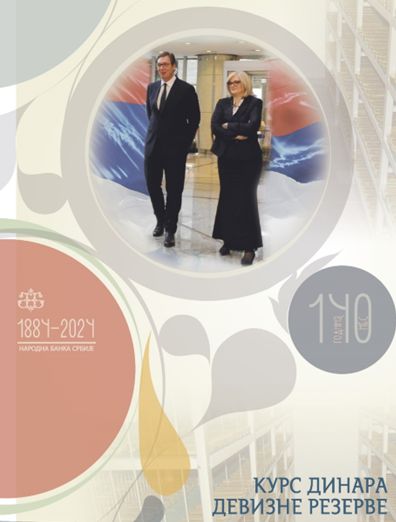The NBS Head Office Building was built from 1888 – 1890, on the basis of blueprints designed by Konstantin Jovanovic (Vienna 1849 – Zurich 1923), son to distinguished artist Anastas Jovanovic...

Exchange rate stability is a new normal in Serbia. The approach to the exchange rate policy of the dinar against the euro has been changed. Instead of allowing significant oscillations which fuelled inflationary pressures, uncertainty of doing business, high exchange rate differences for the domestic economy and rising NPLs, as was the case before August 2012, a key characteristic of the NBS since then to present day is the relative stability of the EUR/RSD exchange rate.
Over the past twelve years, the dinar gained 1.3% in nominal terms against the euro. Throughout this time, the NBS has taken constant care to use FX reserves cautiously in periods of heightened depreciation pressures – by investing in exchange rate stability, and to build up FX reserves at times of prevailing appreciation pressures, creating an additional buffer for the domestic financial system. Since 6 August 2012 to date, the NBS has bought EUR 8.9 bn net in the FX market. In this way, as the most important individual factor, it contributed to a more than twofold increase in the country’s FX reserves which topped EUR 25 bn at end-April 2024.This is EUR 15 bn (almost 150%) more than at end-July 2012 when they measured EUR 10.1 bn, while net FX reserves more than tripled in the same period (rose by 280%) – from EUR 5.5 bn to EUR 21.0 bn.
FX reserves not only increased, but their structure improved as well – the quantity, value and share of gold went up notably.
Since August 2012, the quantity of gold holdings increased almost three times (from 14.8 tonnes in late July 2012 to the current record-high level of 41.2 tonnes). We purchased some of this in the international market (a total of 12 tonnes in 2019 and 2020), while a portion was bought from domestic producers. This is gold of the highest quality and purity (over 99.5%). The share of gold in FX reserves climbed from 6.2% to around 11.4%, and its value increased more than fivefold (from EUR 0.6 bn to EUR 2.9 bn). Since July 2021, after the NBS imported 13 tonnes of gold from abroad (1 tonne remaining from succession and 12 tonnes purchased abroad), all gold reserve holdings have been kept in Serbia, in the NBS’s vaults.
* The latest available data at the moment of the preparation of the brochure.